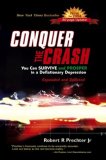Who knew the Stock Market was going to crash?
I did.
Since 2000 I've known it was coming, I've been expecting it, I've been preparing for it. I learned about it from Robert Prechter and the gang at Elliott Wave International (www.elliottwave.com). They've been expecting and forecasting it for more than a decade.
In 2000 I discovered the Elliott Wave principle. In the 1930's, retired accountant Ralph N. Elliott discovered and documented a Fractal Geometry of market price movements. Those fractals are now called "Elliott Waves".
Once Elliott knew what to look for, he saw the same patterns in the prices of bonds, precious metals, commodities, collectables, real estate, the dollar vs other currencies -- anything traded in a free-market auction style arena and for which price data was readily available.
Elliott Waves are not a 100% perfect "crystal ball" for forecasting (nothing like that exists). But, Elliottt Waves DO provide a LOT of insight into which direction the markets probably will move and sometimes precisely how far. Others have continued Elliott's work esp. Robert Prechter and the gang at Elliott Wave International.
In 1995 Robert Prechter published the book "At The Crest of the Tidal Wave", using Elliott Wave analysis to predict the crash we are now in. In 2000 I read "At the Crest" and learned of the pending crash. I also used Prechter and Frost's "Elliott Wave Principle", and other resources from Elliott Wave International, to teach myself the Elliott Wave technique. Since then, I've been using Elliott Waves to help manage my investments.
In 2003 Prechter published an even more important follow-up book titled "Conquer The Crash - You Can SURVIVE and PROSPER in a Deflationary Depression", which I purchased and read as soon as it was published. The first half of that book forecasted the stock market crash we are now in, the second half of the book shares survival strategies. It also indicates the crash still has a long long way to go before it bottoms out. If you read just one book about market forcasting and Elliott Waves, this should be it.
A lot of people are lamenting investment losses, I'm not...
One of the many strategies Prechter shared in "Conquer The Crash" was information about inverse mutual funds. Those are mutual funds that move in the opposite direction of the market they model. For example, Profunds has a "Bear" fund that moves in the opposite direction of the S&P 500 and a leveraged "Ultra Bear" fund that also does so but twice as fast. For example, if the S&P 500 drops 10%, the Bear fund increases 10% and Ultra Bear increases 20%. Conversely, when S&P increases 10%, Bear loses 10% and Ultra Bear loses 20%.
Profunds and others have inverse funds and leveraged inverse funds for the S&P 500, NASDAQ, and Dow Jones Industrial Average. They also have funds that move in the same direction as the markets, including leveraged funds that move twice as fast.
Some of my actual investment results through 10/27/2008 end-of-day:
- On 12/27/2007 I bought more of the Profunds "Ultra Bear" mutual fund, so far that purchase has yielded a 135.4% return on investment
- On 5/9/2008 I bought more Ultra Bear and that purchase is up 115.0%
- On 6/9/2008 I bought more Ultra Bear and that purchase is up 107.9%
- On 9/29/2008 I bought more Ultra Bear and that purchase is up 52.1% (that's a one month yield of 52.1%)
As we get closer to a short term market bottom and Bear Market rally, I will use Elliott Waves to determine when to (temporarily) get out of the above investments and switch to "same direction" leveraged funds like the ProFunds UltraBull. I'll also use Elliott Waves to forecast the topping of the bear market rally to determine when to get out of the "same direction" funds and reinvest in UltraBear.
My basic strategy has been to use Elliott Waves (analyzed by me and those provided by my subscription to Elliott Wave International's publications) to:
- Buy stocks when the individual stock's Elliott Wave patterns imply that stock will rise (and to sell when the Elliott Waves indicate topping of price)
- Buy index funds or leveraged index funds when the the stock market's wave implies rising prices (and to sell those when I think the market is topping)
- Buy inverse funds, leveraged inverse funds, and short sell when I think the market is going to drop (and to get out when I think the market is bottoming).
I am a firm believer in personal responsibility. It is MY responsibility to get the information I need to manage my investements, it is YOUR responsibility to get the information YOU need to manage your investments. That information is readily available to those who are willing to seek it out.
The current crash is only bad news to those who did not expect it, who were not prepared for it, and to those who believe or hope it is close to bottoming out. More crash lies ahead, it is not too late to undo damage already done and to profit from the remaining bear market.
The crash was and is going to happen anyway. To those who anticipate it through tools like Elliott Waves, and who take the necessary precautions, the crash is not entirely bad news -- it can be the financial windfall of a generation! While I feel bad for those hurt by the crash, I choose to not be one of them.
So, who knew the market was going to crash?
Thanks to Elliott Waves: I did! As did the rest of the Elliott Wave International subscribers and other practioners of Elliott Wave.
Disclaimer: I am NOT a financial advisor, I do not give investment advice, I am in no way affiliated with Elliott Wave International or Profounds. I'm just sharing information I have found to be extremely valuable.
Elliott Waves have forecasting benefits that go way beyond just market trends.

Robert Prechter is also pioneering a related science called "Socionomics" that correlates stock market prices and Elliott Waves to a wide variety of cultural events and preferences including:
- Presidential election results
- When nations go to war
- Nuclear weapons testing
- Cultural tastes in best selling fashion, music, movies, and most popular television programs
- Content of news magazine covers
- Creating heroes and destroying them through scandals
Common belief is that outside events influence the markets and social mood. Socionomics believes the opposite: Socionomics believes that social mood creates events and influences the markets.
Stock prices reflect social mood earlier than many other vehicles. Consequently, Elliott Waves can be used to roughly forecast those cultural events and preferences. Likewise, cultural events and preferences corroborate Elliott Wave interpretations.
Do you want to learn more?
Other great resources for Elliott Waves and Socionomics include:
What experiences have you had with Elliott Waves? What other investment forcasting tools and methods have you found to be effective?







You are not authorised to post comments.